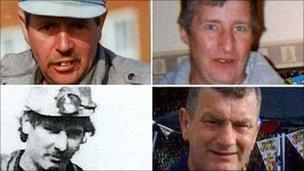Gleision mine deaths: Learn lessons, says Carwyn Jones
- Published
As the first anniversary of the Gleision mining disaster nears, First Minister Carwyn Jones says its lessons must be learned.
David Powell, 50, Charles Breslin, 62, Philip Hill, 44, and Garry Jenkins, 39, died in the Swansea Valley mine on 15 September last year.
Mr Jones said the human cost of such a tragedy must "never be forgotten".
A public appeal which raised more than £1m is being shared between the families of the men.
Mr Jones said: "What happened deep down in that mine at Cilybebyll affected us all. As I said at the time, it was a tragedy for all of Wales.
"The mining industry is burned into the consciousness of Wales; it was a fundamental force in shaping our country.
"However, the human cost that can be extracted along with the coal must never be forgotten.
"The terrible events a year ago were a grim reminder of the dangers faced by miners every time they walk towards their pit for the start of a shift."
He said everybody had been moved by how the community came together to support the families of those affected.
"I also want to pay tribute to the emergency services who worked tirelessly at great personal risk during those dark hours searching for the miners," he said.
"The tragedy at Gleision must never be forgotten and lessons must be learned to make sure an incident like this doesn't happen again and such events are consigned to history."
The four men died after the Gleision drift mine flooded on 15 September, 2011 after a retaining wall holding back a body of water failed.
Three other miners managed to escape as the flood engulfed the drift mine. Two then helped in the attempt to save their colleagues, while another was taken to hospital.
Race against time
A rescue operation was launched in the hope the men could be found alive but their bodies were discovered close together.
This weekend marks the first anniversary of the Gleision Pit disaster in the Swansea Valley.
It was the end of a desperate race against time to find the four men.
The money raised from a public appeal is being shared between the families of the miners, with trust funds set up for the four children who are under 18.
Neath MP Peter Hain, who was a visible presence in the aftermath of the tragedy and who helped set up the public appeal, said the nature of the disaster struck a chord.
In an article marking the anniversary in Swansea's Evening Post newspaper, Mr Hain wrote: "The thing that made it emotionally so powerful, for so many millions of people, was we thought that this type of mining tragedy was something that happened to our grandparents and great grandparents, not something that would happen today.
"But it did! That was what was so serially, terribly shocking about it."
Wayne Thomas from the National Union of Mineworkers for south Wales, and chair of the appeal fund for the victims' families, said in his 30 years underground he had never seen such a thing.
"In a private mine, less than 300 metres at its furthest point, that shouldn't have happened," Mr Thomas said.
"So there are questions and no doubt those questions will be answered in due course - I really hope so anyway."
He added: "Health and safety in the UK is one of the best in Europe.
"Of course, there will be lessons learned from the Gleision disaster, as we've learned lessons from other disasters, but let's wait and see what those investigations are before we make decisions."
Healing process
Huw Evans, a community councillor in Pontardawe, said the healing process in the area had been "quite remarkable", and he was impressed by how quickly money came in for the appeal fund.

The four men died when the mine flooded on 15 September last year
"Of course we would hope that the money is used appropriately, not just for the families, but also for ensuring that (if) such things happen again that the rescue services actually have the facilities to go about their business the best they can," he said.
"The second is thing is that what strikes me in Pontardawe, one local businessman put together his own personal memorial of a spade in a piece of wood, with some coal around it, and a miner's hat on top, and to this day, I checked it last night, it's still standing in the centre of Pontardawe.
"It's never been interfered with and I think it shows how all generations in Pontardawe are actually feeling at the moment."
Several low-key commemorations are planned or have taken place to mark the disaster.
A concert was held underground at Big Pit mining museum in Blaenavon on Thursday to remember the victims of colliery disasters, while the Church in Wales said prayers would be said in all its churches on Sunday.
Tributes will be paid to the miners and rescue teams at the miners welfare brass band competition in Porthcawl on Saturday.
It is understood the families of the miners will mark the day privately.
- Published14 September 2012
- Published3 September 2012
- Published12 January 2012
- Published21 November 2011
- Published17 October 2011
- Published19 September 2011